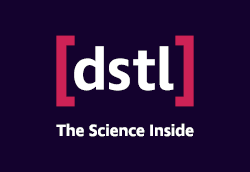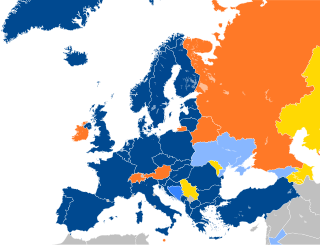
The Defense Advanced Research Projects Agency (DARPA) is a research and development agency of the United States Department of Defense responsible for the development of emerging technologies for use by the military. Originally known as the Advanced Research Projects Agency (ARPA), the agency was created on February 7, 1958, by President Dwight D. Eisenhower in response to the Soviet launching of Sputnik 1 in 1957. By collaborating with academia, industry, and government partners, DARPA formulates and executes research and development projects to expand the frontiers of technology and science, often beyond immediate U.S. military requirements. The name of the organization first changed from its founding name, ARPA, to DARPA, in March 1972, changing back to ARPA in February 1993, then reverted to DARPA in March 1996.

Kazakhstan's approach to foreign relations is multifaceted and strategic, reflecting the country's unique geopolitical position, historical context, and economic ambitions. At the heart of its international diplomacy is a multivector foreign policy, which aims to maintain balanced and diverse relations with all major global powers and regional neighbours. Kazakhstan is a member of the United Nations, Collective Security Treaty Organization, Organization for Security and Co-operation in Europe, North Atlantic Cooperation Council, Commonwealth of Independent States, the Shanghai Cooperation Organisation, and NATO's Partnership for Peace program. Kazakhstan established a customs union with Russia and Belarus which eventually became the Eurasian Economic Union. President Nazarbayev has prioritized economic diplomacy into Kazakhstan's foreign policy.

A remotely operated underwater vehicle (ROUV) or remotely operated vehicle (ROV) is a free-swimming submersible craft used to perform underwater observation, inspection and physical tasks such as valve operations, hydraulic functions and other general tasks within the subsea oil and gas industry, military, scientific and other applications. ROVs can also carry tooling packages for undertaking specific tasks such as pull-in and connection of flexible flowlines and umbilicals, and component replacement. They are often used to visit wrecks at great depths beyond the capacities of submersibles for research purposes, such as the Titanic, amongst others.

Demining or mine clearance is the process of removing land mines from an area. In military operations, the object is to rapidly clear a path through a minefield, and this is often done with devices such as mine plows and blast waves. By contrast, the goal of humanitarian demining is to remove all of the landmines to a given depth and make the land safe for human use. Specially trained dogs are also used to narrow down the search and verify that an area is cleared. Mechanical devices such as flails and excavators are sometimes used to clear mines.

An unmanned ground vehicle (UGV) is a vehicle that operates while in contact with the ground without an onboard human presence. UGVs can be used for many applications where it is inconvenient, dangerous, expensive, or impossible to use an onboard human operator. Typically, the vehicle has sensors to observe the environment, and autonomously controls its behavior or uses a remote human operator to control the vehicle via teleoperation.

The Defence Science and Technology Laboratory (Dstl) is an executive agency of the Ministry of Defence of the United Kingdom. Its stated purpose is "to maximise the impact of science and technology for the defence and security of the UK". The agency is headed by Paul Hollinshead as its chief executive, with the board being chaired by Adrian Belton. Ministerial responsibility lies with the Minister for Defence Procurement.
FSD is a Swiss non-governmental organisation specialising in mine action. Since its creation in 1997, FSD has carried out operations in some 30 countries on four continents. Its programmes include the following four components: humanitarian demining, explosive ordnance risk education, victim assistance, and stockpile destruction and management. In 26 years, more than 1.4 million items of explosive ordnance have been neutralised by FSD.
A mine clearance organization, or demining organization, is an organization involved in the removal of landmines and unexploded ordnance (UXO) for military, humanitarian, or commercial reasons. Demining includes mine clearance, as well as surveying, mapping and marking of hazardous areas.
The United Nations Interregional Crime and Justice Research Institute (UNICRI) is one of the five United Nations Research and Training Institutes. The institute was founded in 1968 to assist the international community in formulating and implementing improved policies in the field of crime prevention and criminal justice. Its work currently focuses on Goal 16 of the 2030 Agenda for Sustainable Development, that is centred on promoting peaceful, just and inclusive societies, free from crime and violence.

Manfred Broy is a German computer scientist, and an emeritus professor in the Department of Informatics at the Technical University of Munich, Garching, Germany.

The Lancaster House Treaties of 2010 are two treaties between the United Kingdom and France for defence and security cooperation. They were signed at 10 Downing Street on 2 November 2010 by British prime minister David Cameron and French President Nicolas Sarkozy. The two treaties collectively are sometimes referred to as the Lancaster House Agreement.

NATO maintains foreign relations with many non-member countries across the globe. NATO runs a number of programs which provide a framework for the partnerships between itself and these non-member nations, typically based on that country's location. These include the Euro-Atlantic Partnership Council and the Partnership for Peace.

Counter-IED equipment are created primarily for military and law enforcement. They are used for standoff detection of explosives and explosive precursor components and defeating the Improvised Explosive Devices (IEDs) devices themselves as part of a broader counter-terrorism, counter-insurgency, or law enforcement effort.
The International Summer School Marktoberdorf is an annual two-week summer school for international computer science and mathematics postgraduate students and other young researchers, held annually since 1970 in Marktoberdorf, near Munich in southern Germany. Students are accommodated in the boarding house of a local high school, Gymnasium Marktoberdorf. Proceedings are published when appropriate.
Science and technology in Tajikistan examines government efforts to develop a national innovation system and the impact of these policies.

Europe-Georgia Institute (EGI) – is a non-governmental organization and a pro-European think tank in Georgia. The Europe-Georgia Institute was founded by George Melashvili, Shalva Chkheidze and Revaz Topuria in 2015.

The European Defence Fund (EDF) is a component of the European Union's (EU) Common Security and Defence Policy (CSDP) which aims to coordinate and increase national investment in defence research and improve interoperability between national armed forces. It was proposed in 2016 by Commission President Jean-Claude Juncker and established in 2017. The fund has two stands; Research and Development & Acquisition. In July 2018, the European Commission announced that the EDF budget for 2021-2027 would be €13 billion. This sum was later revised by the European Commission as part of the new EU budget proposed on May 27, 2020, as a result of the COVID-19 pandemic, according to which the EDF will be allocated €8 billion over this budget period.

The Centre for Artificial Intelligence and Robotics at the United Nations Interregional Crime and Justice Research Institute (UNICRI) was established to advance understanding of artificial intelligence (AI), robotics and related technologies with a special focus on crime, terrorism and other threats to security, with the goal of supporting and assisting UN Member States in understanding the risks and benefits of these technologies and exploring their use for contributing to a future free of violence and crime.

Armenia and the North Atlantic Treaty Organization (NATO) have maintained a formal relationship since 1992, when Armenia joined the North Atlantic Cooperation Council. Armenia officially established bilateral relations with NATO in 1994 when it became a member of NATO's Partnership for Peace (PfP) programme. In 2002, Armenia became an Associate Member of the NATO Parliamentary Assembly.
Gregory Falco is an American inventor and researcher. Falco is a professor at Cornell University. He is a pioneer in the field of cybersecurity research and its aerospace applications. Falco is the founding chair of IEEE's Standard for Space System Cybersecurity and the NATO Country Project Director for the NATO Science for Peace and Security effort to reroute the internet to space.















